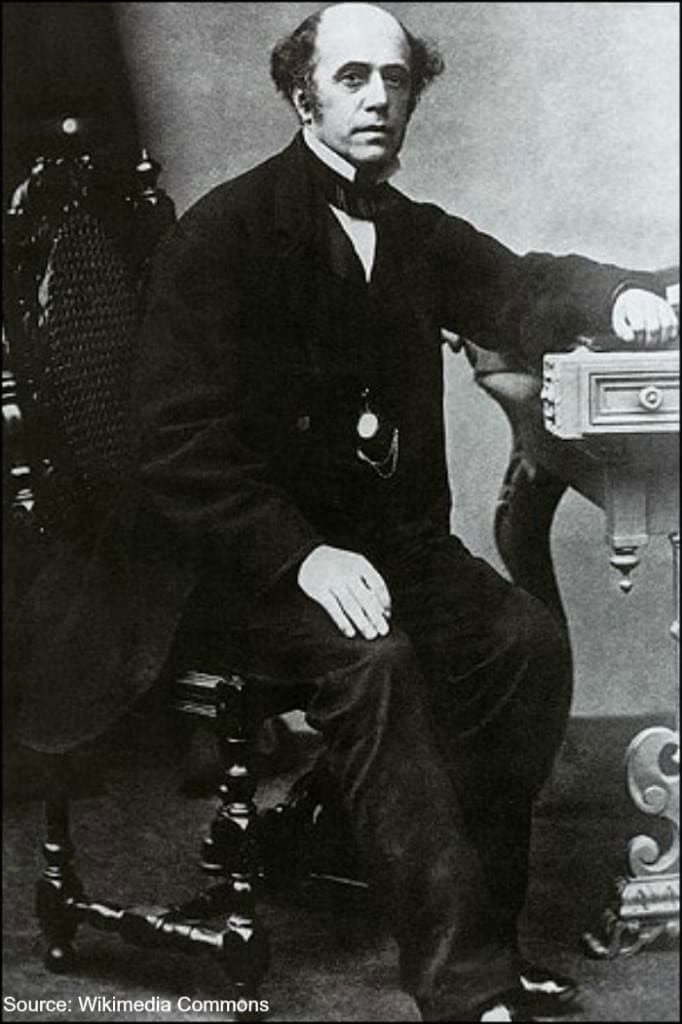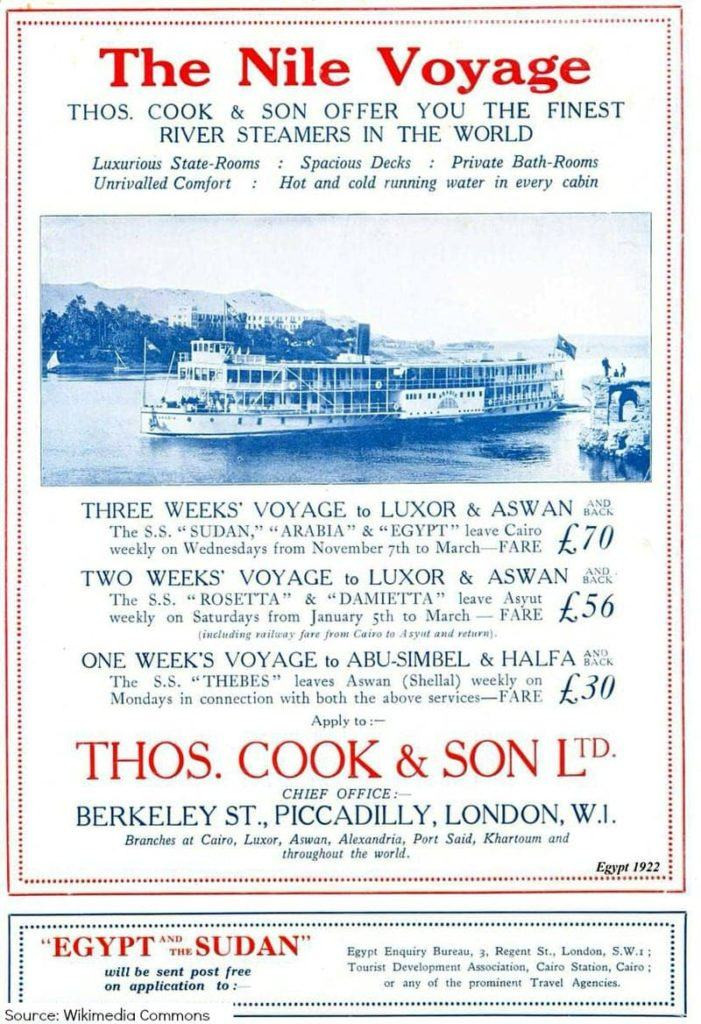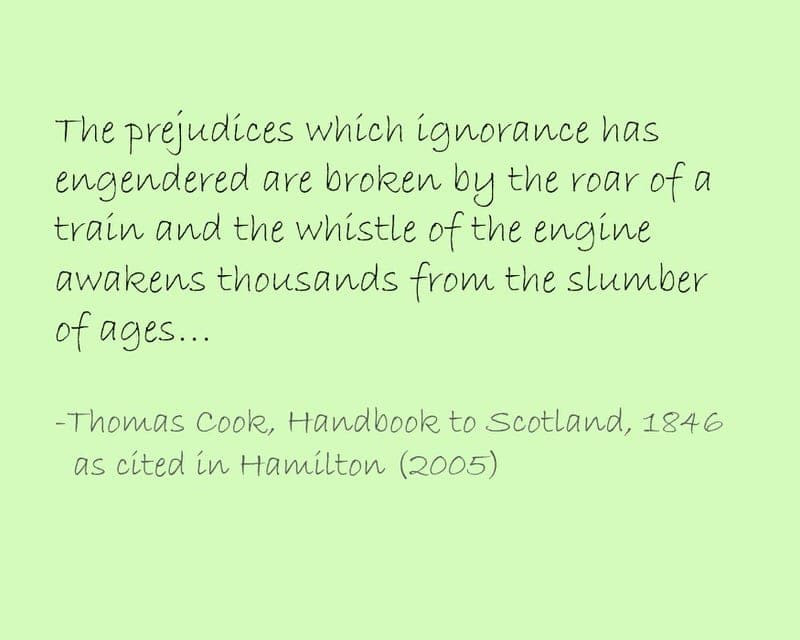Are you curious about the origins of modern tourism and the visionary who shaped it? The “Father Of Tourism” is a title often bestowed upon Thomas Cook, a 19th-century British pioneer who revolutionized travel. SIXT.VN understands the importance of historical context in shaping today’s travel experiences. Discover his groundbreaking contributions and how they continue to influence the way we explore the world, and let SIXT.VN help you create your own unforgettable journey in Vietnam. We make travel easy and convenient, just as Cook envisioned, and our services include everything from airport transfers to hotel bookings and curated tours, ensuring a seamless experience.
1. Who Was Thomas Cook, the Father of Tourism?
Thomas Cook (1808-1892) is widely regarded as the father of modern tourism. He was a British businessman and entrepreneur who revolutionized travel in the 19th century. According to “Thomas Cook: The Holiday Maker” by Jill Hamilton (2005), Cook’s innovative approach to organizing group travel transformed leisure activities and made exploration accessible to a broader segment of society.
1.1. Early Life and Influences of Thomas Cook
Born in Melbourne, Derbyshire, England, Thomas Cook’s early life was marked by hardship. He started working at a young age and held various jobs, including a wood turner and a Baptist lay preacher. His religious beliefs and involvement in the temperance movement significantly influenced his career path. Cook believed in the power of travel to broaden horizons and promote positive social change, which fueled his desire to make travel more accessible.
1.2. The Temperance Movement and the First Excursion
Cook’s involvement in the temperance movement led to his first foray into organized travel. On July 5, 1841, he arranged a special train to transport over 500 temperance supporters from Leicester to a meeting in Loughborough, about 11 miles away. This excursion is considered the first organized tour, marking the birth of modern tourism. According to Piers Brendon in “Thomas Cook – 150 Years of Popular Tourism” (1991), this event showcased Cook’s ability to coordinate transportation and activities for a large group, laying the foundation for his future ventures.
1.3. Expanding the Travel Business
Following the success of his first excursion, Cook began organizing trips for various purposes, including leisure and education. He expanded his operations to include destinations within the UK and eventually to continental Europe, North America, and beyond. Cook’s company offered all-inclusive travel packages that included transportation, accommodation, and meals, making travel more convenient and affordable for the middle class.
 Thomas Cook Thomas Cook & Son travel history
Thomas Cook Thomas Cook & Son travel history
2. What Were Thomas Cook’s Key Innovations in Tourism?
Thomas Cook introduced several groundbreaking innovations that transformed the travel industry. His contributions include organized tours, inclusive packages, travel vouchers, and guidebooks. These innovations streamlined travel planning and made exploration more accessible to a wider audience.
2.1. Organized Group Tours
Cook’s most significant innovation was the concept of organized group tours. By arranging transportation, accommodation, and activities in advance, he eliminated many of the challenges associated with independent travel. This allowed travelers to relax and enjoy their experience without worrying about logistics. According to Lynne Withey in “Grand Tours and Cook’s Tours – A History of Leisure Travel, 1750 to 1915” (1997), Cook’s organized tours democratized travel, making it accessible to individuals who may not have had the resources or confidence to travel independently.
2.2. Inclusive Travel Packages
Cook’s travel packages included transportation, accommodation, meals, and sightseeing, providing travelers with a comprehensive and hassle-free experience. This all-inclusive approach simplified travel planning and allowed travelers to budget their expenses more effectively. By bundling services together, Cook was able to negotiate discounts with hotels and transportation providers, passing the savings on to his customers.
2.3. Travel Vouchers and Traveler’s Cheques
To facilitate travel in foreign countries, Cook introduced travel vouchers that could be exchanged for accommodation and meals at designated establishments. He also developed traveler’s cheques, which provided a safe and convenient way for travelers to carry money. These financial instruments reduced the risk of theft and eliminated the need to exchange currency at every destination.
2.4. Printed Guidebooks and Timetables
Cook recognized the importance of providing travelers with reliable information about their destinations. He published guidebooks and timetables that included details about attractions, accommodation, transportation, and local customs. These publications helped travelers plan their itineraries and navigate unfamiliar environments. According to a Wikipedia link on Thomas Cook’s Traveler Handbooks, these guides became essential resources for travelers in the 19th century.
 Thomas Cook Thomas Cook & Son travel history
Thomas Cook Thomas Cook & Son travel history
3. How Did Thomas Cook Impact the Development of Modern Tourism?
Thomas Cook’s impact on the development of modern tourism is undeniable. He transformed travel from an exclusive privilege of the wealthy to an accessible activity for the middle class. His innovations in organized tours, inclusive packages, and travel services laid the foundation for the modern tourism industry.
3.1. Making Travel Accessible to the Middle Class
Prior to Cook’s innovations, travel was primarily limited to the wealthy elite who could afford the time and expense of independent travel. By offering affordable and convenient travel packages, Cook made exploration accessible to the middle class. This democratization of travel had a profound impact on society, allowing individuals from diverse backgrounds to experience new cultures and broaden their horizons.
3.2. Promoting International Travel and Cultural Exchange
Cook’s tours extended beyond the UK to destinations across Europe, North America, and the Middle East. He encouraged travelers to explore new cultures and learn about different ways of life. This promotion of international travel fostered cultural exchange and understanding, contributing to a more interconnected world.
3.3. Establishing Travel Agencies and Industry Standards
Cook’s company, Thomas Cook & Son, became one of the largest and most successful travel agencies in the world. His business model set the standard for the modern travel industry, influencing the development of travel agencies, tour operators, and other related businesses.
3.4. Influencing Infrastructure Development
The growth of tourism spurred by Cook’s innovations led to significant investments in infrastructure, including railways, hotels, and other tourist facilities. These developments improved transportation and accommodation options, further enhancing the travel experience.
4. What Challenges Did Thomas Cook Face in Pioneering Tourism?
Despite his success, Thomas Cook faced numerous challenges in pioneering tourism. He had to overcome skepticism from the upper classes, logistical difficulties in organizing travel, and financial setbacks. His perseverance and determination ultimately led to his triumph in transforming the travel industry.
4.1. Resistance from the Upper Classes
Cook’s efforts to make travel accessible to the middle class were met with resistance from the upper classes, who viewed tourism as their exclusive domain. They criticized Cook’s tours for bringing “uncouth” and “uneducated” travelers to their exclusive destinations. This class snobbery created social barriers that Cook had to overcome in order to expand his business.
4.2. Logistical Challenges in Organizing Travel
Organizing group travel in the 19th century presented numerous logistical challenges. Cook had to coordinate transportation, accommodation, and activities for large groups of travelers, often in unfamiliar environments. He also had to deal with issues such as language barriers, currency exchange, and cultural differences.
4.3. Financial Setbacks and Business Risks
Cook’s travel business faced financial setbacks and risks, including economic downturns, political instability, and unexpected events such as wars and natural disasters. He had to manage his finances carefully and adapt to changing circumstances in order to maintain his company’s stability.
4.4. Personal Struggles and Family Issues
In addition to his business challenges, Cook faced personal struggles and family issues. He experienced the tragic loss of his daughter and the declining health of his wife. He also had a strained relationship with his son, who eventually took over the family business. These personal challenges added to the burden of pioneering tourism.
 Thomas Cook Thomas Cook & Son travel history
Thomas Cook Thomas Cook & Son travel history
5. What Was Travel Like During the Victorian Era?
Travel during the Victorian era (1837-1901) was vastly different from modern travel. Transportation was slower and less comfortable, accommodation options were limited, and travelers faced various health and safety risks. However, the Victorian era also saw significant advancements in travel technology, such as the development of railways and steamships, which made exploration more accessible.
5.1. Transportation: Stagecoaches, Trains, and Steamships
Before the widespread adoption of railways, stagecoaches were the primary mode of transportation. Stagecoach travel was slow, uncomfortable, and expensive, limiting it to the wealthy. The development of railways in the mid-19th century revolutionized travel, making it faster and more affordable. Steamships also played a crucial role in international travel, connecting continents and facilitating global exploration.
5.2. Accommodation: Inns, Hotels, and Private Homes
Accommodation options during the Victorian era ranged from basic inns to luxurious hotels. Inns were often simple and lacked modern amenities, while hotels catered to wealthier travelers with more comfortable rooms and services. Some travelers also stayed in private homes, renting rooms from local residents.
5.3. Health and Safety Concerns
Travelers during the Victorian era faced various health and safety concerns, including disease, poor sanitation, and crime. Water sources were often contaminated, and food hygiene standards were low. Travelers also had to be wary of theft and other crimes, particularly in crowded cities.
5.4. Communication and Information
Communication during the Victorian era was slow and unreliable. Postal mail was the primary means of communication, and it could take weeks or even months to send and receive letters. Information about destinations was limited, and travelers often relied on guidebooks and personal recommendations.
6. How Did Thomas Cook Tours Transform Social Norms?
Thomas Cook’s tours played a significant role in transforming social norms during the Victorian era. By making travel accessible to the middle class, he challenged traditional class distinctions and promoted social mobility. His tours also provided opportunities for women to travel independently, empowering them and challenging gender stereotypes.
6.1. Challenging Class Distinctions
Cook’s tours blurred the lines between social classes by bringing together individuals from diverse backgrounds. This mixing of classes challenged traditional social hierarchies and promoted a more egalitarian society.
6.2. Empowering Women Through Travel
Cook’s tours provided opportunities for women to travel independently, without the need for male chaperones. This newfound freedom empowered women and challenged traditional gender roles. According to Lynne Withey in “Grand Tours and Cook’s Tours,” a large percentage of Cook’s travelers were single or unescorted women who likely would not have been able to travel on their own, but being part of an escorted tour provided them with both protection and independence.
6.3. Promoting Education and Cultural Understanding
Cook believed that travel could educate and enlighten people, helping them to overcome prejudices and broaden their perspectives. His tours exposed travelers to new cultures and ideas, fostering cultural understanding and tolerance.
6.4. Encouraging Temperance and Social Reform
As a devout Baptist and advocate for the temperance movement, Cook incorporated his social values into his tours. He promoted alcohol-free excursions and encouraged travelers to engage in educational and uplifting activities.
 Thomas Cook travel agency store UK
Thomas Cook travel agency store UK
7. What Led to the Bankruptcy of Thomas Cook in 2019?
The Thomas Cook travel agency, which had been in operation for 178 years, declared bankruptcy in September 2019. Several factors contributed to its downfall, including changing consumer preferences, increased competition from online travel agencies, and financial mismanagement.
7.1. Changing Consumer Preferences
In recent years, consumer preferences have shifted towards independent travel planning and booking. Many travelers now prefer to book their own flights and accommodation online, rather than using traditional travel agencies. This trend has eroded the market share of established travel companies like Thomas Cook.
7.2. Increased Competition from Online Travel Agencies
Online travel agencies (OTAs) such as Booking.com and Expedia have disrupted the travel industry with their user-friendly platforms, competitive prices, and wide range of options. These OTAs have made it easier and more affordable for travelers to plan and book their own trips, further challenging traditional travel agencies.
7.3. Financial Mismanagement and Debt
Thomas Cook had accumulated a significant amount of debt over the years, which made it difficult to adapt to changing market conditions. The company also faced challenges in integrating its various business units and streamlining its operations. These financial and operational issues ultimately led to its bankruptcy.
7.4. Impact of the Bankruptcy on Travelers and Employees
The bankruptcy of Thomas Cook had a significant impact on travelers and employees. Thousands of travelers were stranded abroad, and many lost their jobs. The UK government launched a massive repatriation effort to bring stranded travelers home, and efforts were made to find new employment for former Thomas Cook employees.
8. What Lessons Can Be Learned from Thomas Cook’s Legacy?
Despite the bankruptcy of his company, Thomas Cook’s legacy as the father of tourism remains intact. His innovations transformed the travel industry and made exploration accessible to millions of people. His story provides valuable lessons about entrepreneurship, innovation, and the importance of adapting to changing market conditions.
8.1. The Importance of Innovation and Adaptability
Cook’s success was based on his ability to innovate and adapt to changing market conditions. He introduced new products and services that met the needs of travelers and transformed the travel industry. His story underscores the importance of continuous innovation and adaptability in business.
8.2. The Value of Customer Service and Reliability
Cook built his reputation on providing excellent customer service and reliable travel arrangements. His customers trusted him to deliver on his promises and provide them with a positive travel experience. This emphasis on customer service and reliability is essential for success in the tourism industry.
8.3. The Significance of Social Impact
Cook believed that travel could have a positive social impact by promoting education, cultural understanding, and social reform. He incorporated his values into his business and used his tours to promote these goals. His story highlights the importance of considering the social impact of business activities.
8.4. The Challenges of Maintaining a Legacy
The bankruptcy of Thomas Cook serves as a reminder of the challenges of maintaining a legacy in a rapidly changing world. Even the most successful companies can face unforeseen challenges and risks. It is essential to remain vigilant and adapt to changing market conditions in order to preserve a legacy.
9. How Can You Experience the Spirit of Thomas Cook’s Travel Today with SIXT.VN?
While the original Thomas Cook travel agency is no longer in operation, the spirit of his travel innovations lives on through companies like SIXT.VN. We strive to make travel accessible, convenient, and enriching for all, just as Cook envisioned.
9.1. Convenient Airport Transfers
Arrive in Vietnam stress-free with SIXT.VN’s reliable airport transfer services. Our professional drivers will greet you at the airport and transport you to your hotel or other destination in comfort and style.
9.2. Wide Selection of Hotels
SIXT.VN offers a wide selection of hotels to suit every budget and preference. Whether you’re looking for a luxury resort or a budget-friendly guesthouse, we can help you find the perfect accommodation for your trip.
9.3. Curated Tours and Activities
Explore Vietnam’s rich culture and natural beauty with SIXT.VN’s curated tours and activities. From historical sites to culinary adventures, we offer a variety of experiences to suit your interests.
9.4. Personalized Travel Planning
Let SIXT.VN help you plan your perfect trip to Vietnam. Our travel experts can provide personalized recommendations and assistance with all aspects of your travel arrangements, from flights to accommodation to activities. Contact us at Hotline/Whatsapp: +84 986 244 358 or visit our website SIXT.VN. Our address is 260 Cau Giay, Hanoi, Vietnam.
 Thomas Cook Thomas Cook & Son travel history
Thomas Cook Thomas Cook & Son travel history
10. What Are Some Interesting Facts About Thomas Cook?
Thomas Cook’s life and career are full of interesting facts and anecdotes. Here are a few lesser-known details about the father of tourism:
10.1. Cook Was a Cabinet Maker
Before becoming a travel organizer, Cook worked as a cabinet maker. This experience likely honed his organizational and logistical skills, which he later applied to his travel business.
10.2. Cook Advocated for Total Abstinence
Cook was a staunch advocate for total abstinence from alcohol. He believed that alcohol abuse was a major social problem and promoted temperance through his tours and other activities.
10.3. Cook’s First Tour Was for Temperance Supporters
Cook’s first organized tour was for over 500 temperance supporters who traveled by train from Leicester to Loughborough for a temperance meeting. This event marked the beginning of his career as a travel organizer.
10.4. Cook Introduced Circular Notes
Cook introduced circular notes, a precursor to traveler’s checks, to make it easier for travelers to manage their finances in foreign countries. These notes could be exchanged for local currency at designated banks and businesses.
10.5. Cook’s Tours Included Religious Pilgrimages
In addition to leisure travel, Cook organized religious pilgrimages to destinations such as the Holy Land. These tours allowed travelers to visit important religious sites and deepen their faith.
Thomas Cook’s legacy as the father of tourism continues to inspire travelers and travel professionals around the world. His innovations transformed the travel industry and made exploration accessible to millions of people. As you plan your next adventure, remember the lessons of Thomas Cook and strive to travel with a spirit of curiosity, respect, and social responsibility. Let SIXT.VN be your guide to creating unforgettable travel experiences in Vietnam.
FAQ About the Father of Tourism
1. Who is Considered the “Father of Tourism”?
Thomas Cook is widely considered the “father of tourism.”
2. What Was Thomas Cook’s Main Contribution to Tourism?
He pioneered organized group travel and inclusive travel packages.
3. How Did Thomas Cook Make Travel More Accessible?
He made travel more affordable and convenient for the middle class.
4. What Were Some of Thomas Cook’s Innovations?
Organized tours, travel vouchers, and printed guidebooks.
5. How Did Thomas Cook Impact Social Norms?
He challenged class distinctions and empowered women through travel.
6. What Led to the Bankruptcy of Thomas Cook in 2019?
Changing consumer preferences and financial mismanagement.
7. What Lessons Can Be Learned from Thomas Cook’s Legacy?
The importance of innovation, customer service, and social impact.
8. How Can You Experience the Spirit of Thomas Cook’s Travel Today?
Through convenient and enriching travel services offered by companies like SIXT.VN.
9. Was Thomas Cook a Religious Man?
Yes, he was a devout Baptist and advocate for the temperance movement.
10. Did Thomas Cook Only Focus on Leisure Travel?
No, he also organized religious pilgrimages and educational tours.



